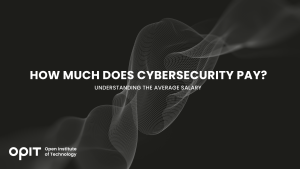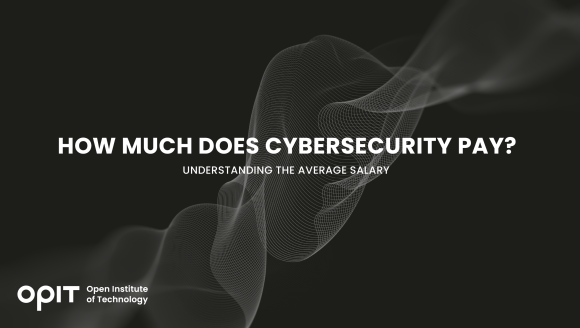

Cybersecurity jobs are better paid than you might expect. Given the skyrocketing significance of the data protection industry, that shouldn’t come as much of a surprise.
If you’ve been wondering what cybersecurity experts take home at the end of the day, this article will reveal the numbers involved. After all, knowing what you could earn gives a clearer picture of whether this field would be worthwhile endeavor for you or not.
Factors Influencing Cybersecurity Jobs Salary
First, let’s look at what makes one cybersecurity job pay more than another. The distinction goes beyond how good an individual is with computers or their knowledge around firewalls, proxies, and the like. Location is also a big factor. Living in or around tech hubs usually means higher pay, but also much higher living costs.
There is also the factor of experience to consider. The more years in the field, the more your salary will grow.
Also, your education level and qualifications matter, too. However, whatever your skill or education level, demand for cybersecurity talent is high. Businesses everywhere are looking for cyber defenders. Therefore, skilled professionals are in a position to negotiate for high pay for their services.
Cybersecurity Salary Overview: Entry-Level vs. Experienced Workers
So, how much does cybersecurity pay? It’s worth noting that you might not make a huge sum right away. But the growth potential within the field is impressive. Entry-level salaries are decent, but as you climb the ranks, your salary will increase accordingly.
It will also depend on the type of job you do. Penetration testers, security analysts, or CISO chairs all have different salaries at different levels. The main thing to remember is that pay will often reflect your skills, so honing them is the main way to help your future earnings soar.
In Europe, starting figures for cybersecurity salary are around €37,000, and can grow to significant sums as you climb the ranks, especially in roles like CISOs where salaries can reach upwards of €180,000.
How Much Do Cybersecurity Professionals Make Globally?
If you’re thinking of taking your cybersecurity talents on a global tour, know that the cybersecurity average salary varies widely around the world. The figures are influenced by local market demand, economic conditions, and living expenses. However, here is a thought worth considering: remote work is changing the way payments for these fields are distributed globally. Now, you can live in one country and work for a company in another, potentially earning more than the local rate. For that reason, it’s an exciting time to explore international opportunities and the global demand to make the most of your skills.
But how much do cybersecurity professionals make in Europe? The salaries are excellent, but can vary depending on where you live. For instance, if you’re eyeing a spot as an entry-level cybersecurity analyst in Germany, you might be looking at an average of €52,539 ($57,420) in 2024. The numbers naturally vary based on role, experience, and location.
Entry-level cybersecurity analysts in the U.S. have starting salaries of around $68,202, rising up to $112,000 as a median figure. Meanwhile, a cyber security engineer in Japan can expect an average cybersecurity salary of around ¥6,963,427 (approximately USD $55,300) in 2024
Maximizing Your Cybersecurity Salary Potential
While the earnings sound appealing, you need the skills and knowledge to harness your earning potential. To climb the ladder, you must make strategic choices to earn the perks, more than anything, through continuous education. Since technology moves at breakneck speeds, and cyber threats emerge even faster, keeping up and staying ahead of the game means being a lifelong learner. Put simply, your education doesn’t end once you leave college or complete a course. As such, you should get extra certificates to show prospective employers that you aren’t being left behind.
However, don’t neglect the power of networking, either. It goes beyond an online presence or having a LinkedIn account. Engage with the cyber security community, attend industry meetups, present your own findings and projects, and lend a hand with open-source projects. Get to know people and you’ll gain opportunities you wouldn’t find in a job ad.
If you’re looking for a place to boost the skills and connections, OPIT is here to help. OPIT’s career-aligned online programs can catapult you into higher-earning roles.
OPIT’s Master’s in Cybersecurity
OPIT’s master’s program in Cybersecurity is one of the most efficient ways to gain the skills and knowledge that can propel you into the upper echelons of cybersecurity. The program is more than a traditional academic education in computer science and cybersecurity. It’s a challenging undertaking but rewards you with knowledge that you can apply in real-life circumstances right away, through practical sessions and workshops.
Over the course of this program, you’ll tackle digital forensics, encryption, firewalls, security systems, and also the strategic thinking behind secure network design. After all, cybersecurity thrives on critical thinking in stress-intensive circumstances and being flexible and creative enough to come up with solutions “on the spot.” However, you’ll be well-equipped for these trials by learning from the best in the industry, people who’ve been at the forefront of cybersecurity debate for years.
High Risk, High Reward
The salaries people earn within cybersecurity sphere reflect the major demand in the field and the skills necessary to complete the job effectively. If you play your cards right, you might be protecting the systems and IT infrastructures of major businesses, nonprofits, or governmental organizations. However, to get to that point, you must learn, and never stop learning. Just as importantly, never underestimate the power of networking and maintaining good relationships.
Programs like OPIT’s master’s degree in cybersecurity are some of the best ways to hone the skills from anywhere in the world, learning from the best in the industry, all at your own pace. Give it a try and see how much of a difference it can make.
Related posts

Source:
- EFMD Global, Published on July 12th, 2024.
By Stephanie Mullins
Many people love to read the stories of successful business school graduates to see what they’ve achieved using the lessons, insights and connections from the programmes they’ve studied. We speak to one alumnus, Riccardo Ocleppo, who studied at top business schools including London Business School (LBS) and INSEAD, about the education institution called OPIT which he created after business school.
Please introduce yourself and your career to date.
I am the founder of OPIT — Open Institute of Technology, a fully accredited Higher Education Institution (HEI) under the European Qualification Framework (EQF) by the MFHEA Authority. OPIT also partners with WES (World Education Services), a trusted non-profit providing verified education credential assessments (ECA) in the US and Canada for foreign degrees and certificates.
Prior to founding OPIT, I established Docsity, a global community boasting 15 million registered university students worldwide and partnerships with over 250 Universities and Business Schools. My academic background includes an MSc in Electronics from Politecnico di Torino and an MSc in Management from London Business School.
Why did you decide to create OPIT Open Institute of Technology?
Higher education has a profound impact on people’s futures. Through quality higher education, people can aspire to a better and more fulfilling future.
The mission behind OPIT is to democratise access to high-quality higher education in the fields that will be in high demand in the coming decades: Computer Science, Artificial Intelligence, Data Science, Cybersecurity, and Digital Innovation.
Since launching my first company in the education field, I’ve engaged with countless students, partnered with hundreds of universities, and collaborated with professors and companies. Through these interactions, I’ve observed a gap between traditional university curricula and the skills demanded by today’s job market, particularly in Computer Science and Technology.
I founded OPIT to bridge this gap by modernising education, making it affordable, and enhancing the digital learning experience. By collaborating with international professors and forging solid relationships with global companies, we are creating a dynamic online community and developing high-quality digital learning content. This approach ensures our students benefit from a flexible, cutting-edge, and stress-free learning environment.
Why do you think an education in tech is relevant in today’s business landscape?

As depicted by the World Economic Forum’s “Future of Jobs 2023” report, the demand for skilled tech professionals remains (and will remain) robust across industries, driven by the critical role of advanced technologies in business success.
Today’s companies require individuals who can innovate and execute complex solutions. A degree in fields like computer science, cybersecurity, data science, digital business or AI equips graduates with essential skills to thrive in this dynamic industry.
According to the International Monetary Fund (IMF), the global tech talent shortage will exceed 85 million workers by 2030. The Korn Ferry Institute warns that this gap could result in hundreds of billions in lost revenue across the US, Europe, and Asia.
To address this challenge, OPIT aims to democratise access to technology education. Our competency-based and applied approach, coupled with a flexible online learning experience, empowers students to progress at their own pace, demonstrating their skills as they advance.
Read the full article below:

Source:
- The European, Summer 2024 Edition, Page 24
With careful planning, ethical considerations, and ensuring human oversight is maintained, AI can have huge market research benefits, says Lorenzo Livi of the Open Institute of Technology.
By Lorenzo Livi
To market well, you need to get something interesting in front of those who are interested. That takes a lot of thinking, a lot of work, and a whole bunch of research. But what if the bulk of that thinking, work and research could be done for you? What would that mean for marketing as an industry, and market research specifically?
With the recent explosion of AI onto the world stage, big changes are coming in the marketing industry. But will AI be able to do market research as successfully? Simply, the answer is yes. A big, fat, resounding yes. In fact, AI has the potential to revolutionise market research.
Ensuring that people have a clear understanding of what exactly AI is is crucial, given its seismic effect on our world. Common questions that even occur amongst people at the forefront of marketing, such as, “Who invented AI?” or, “Where is the main AI system located?” highlight a widespread misunderstanding about the nature of AI.
As for the notion of a central “main thing” running AI, it’s essential to clarify that AI systems exist in various forms and locations. AI algorithms and models can run on individual computers, servers, or even specialized hardware designed for AI processing, commonly referred to as AI chips. These systems can be distributed across multiple locations, including data centres, cloud platforms, and edge devices. They can also be used anywhere, so long as you have a compatible device and an internet connection.
While the concept of AI may seem abstract or mysterious to some, it’s important to approach it with a clear understanding of its principles and applications. By promoting education and awareness about AI, we can dispel misconceptions and facilitate meaningful conversations about its role in society.
Read the full article below:
- The European, Pages 24 to 26.
Have questions?
Visit our FAQ page or get in touch with us!
Write us at +39 335 576 0263
Get in touch at hello@opit.com
Talk to one of our Study Advisors
We are international
We can speak in:


